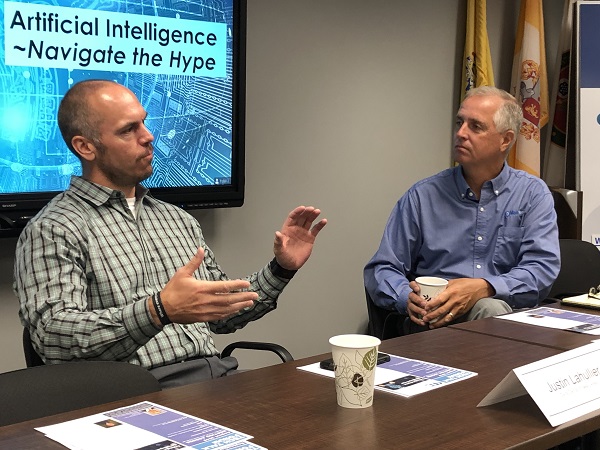The “Good, the Bad and the Ugly” of AI Discussed at Morris County Chamber of Commerce
Healthcare insurance tech executive Justin Lahullier borrowed the title of the iconic spaghetti Western movie “The Good, the Bad and the Ugly” to describe the past, present and future of artificial technology (AI) during the Morris County Chamber of Commerce meeting on August 20, in Florham Park.
Like Clint Eastwood’s character in the shoot-em-up flick, the AI business has survived a long and sometimes rough ride. But Lahullier, CIO of Delta Dental of New Jersey and Connecticut (Parsippany), said that AI’s journey is finally paying off, making life easier and more productive, though it’s still a work in progress and prone to errors.
Despite all of its faults, however, AI has had a tremendous impact on the digital economy.
One study found that the AI market is expected to grow to $190 billion by 2025, and a report by Accenture (Ann Arbor, Mich.) predicted that the technology will boost profitability by 38 percent and generate $14 trillion in additional revenue by 2023.
In recent years, AI has gained a lot of attention as a disruptive technology, but its origins hark back to the 1950s. Further progress on the technology came to a virtual standstill in the mid-1960s, which Lahullier says was dubbed the “AI winter.”
Decades later, the demand for AI heated up again, thanks to big tech firms playing games.
The IBM’s chess-playing computer, known as “Deep Blue” (located in Armonk, N.Y.) was credited with helping to spark renewed interest in AI when it twice defeated then-reigning world champion Gary Kasparov in the mid-1990s.
Years later, Google used AI technology to match wits with humans playing “Go,” an ancient Chinese board game. The Google invention’s ability to beat its human opponents played an integral role in “where we started seeing the power of AI and looking at places where we could apply it to different industries,” Lahullier said.
The Good
Today, businesses are using machine learning, virtual voice assistants, chatbots, robotics and other AI-driven technologies to reduce costs, boost revenues, improve workers’ skills, cut fraud and waste and help level the playing field against competitors. For consumers, AI offers a number of benefits, ranging from smart homes to driverless vehicles.
Within a relatively short period of time, AI has undergone a dramatic attitudinal shift in society, especially among those who are responsible for using technology to make businesses operate more efficiently.
For example, Lahullier cited a 2019 survey by Gartner Consulting (Stamford, Conn.) that found that 40 percent of CIOs at top-performing companies felt AI was a game-changing technology, compared with 7 percent in the prior year.
Delta Dental (Alpharetta, Ga.), the country’s largest dental insurer, is already investing heavily in AI, particularly in its call centers. The company can now record conversations between its call center agents and customers, and feed them into machine-learning technology, to create an improved customer experience.
Lahullier said that the increasing use of AI in business operations should help companies make their employees more productive, rather than enabling companies to shrink their payrolls. “We don’t see it as a human-replacement technology. We see it as a human-enhancement technology.”
AI’s impact on the workforce may not be as ominous as some have feared. One study found that AI will eliminate 1.8 million jobs by 2020, but will create 2.3 million jobs in the same time frame, though many of the newly created positions will ostensibly require new skills.
While some companies may view AI as a panacea, Lahullier cautioned that businesses need to clearly understand why and how they would use the technology and what benefits they can derive from it. “You ultimately want to think through your business case and what you want AI to do for you before you start to implement it.”
The Bad
One major concern of AI is how intrusive it will become as the technology becomes more advanced and gains greater acceptance in society.
Privacy is a valid concern, given the vast amounts of data that are collected, stored and distributed. While there are “a lot of conversations” on this topic, Lahullier expects AI’s impact on privacy to become less of an issue for the current and future generations of digital natives (i.e., those who grow up with the internet).
“The barrier to privacy is lowering as the younger generation comes into the workforce and the consumer market,” he said. “This is going to become more of the norm.”
Biased or bad data fed into AI systems is also “definitely an area of concern,” Lahullier noted. One example given was an AI application that was programmed to turn on water faucets for only hands with lighter skin tones.
Another problem is when there’s no explanation given on how or why AI algorithms arrived at a certain answer. Lahullier said that this is a big red flag for those companies in highly regulated industries, such as the healthcare sector. “If you’re applying the algo into the medical field and if you can’t explain why it’s always right, there are going to be concerns.”
The Ugly
One highly publicized and controversial incidents involving AI gone wrong was the ill-fated launch of an online chatbot by Microsoft a few years ago. The tech giant quickly removed the rogue chatbot after it had reportedly posted inflammatory and offensive tweets on its Twitter account.
According to Lahullier, humans should embrace, and not fear, AI, as it has the power to give mankind the technological leap forward that will be needed in the years ahead. “AI extends the human experience, allowing humans to do things that they might not be able to do themselves.”




